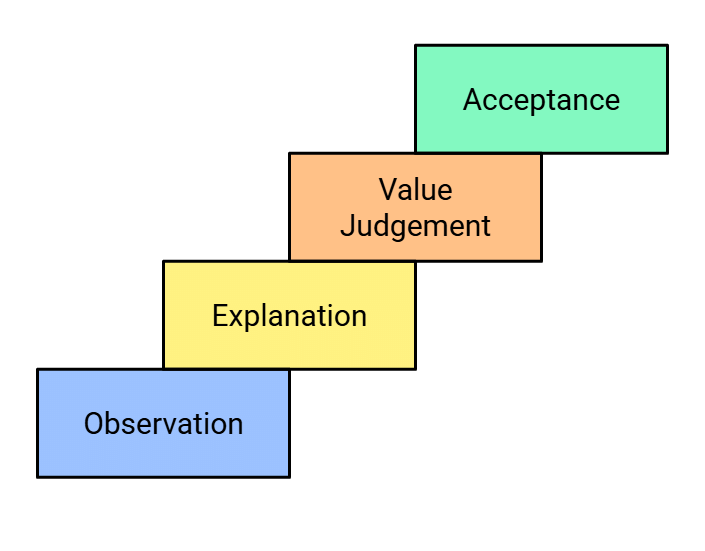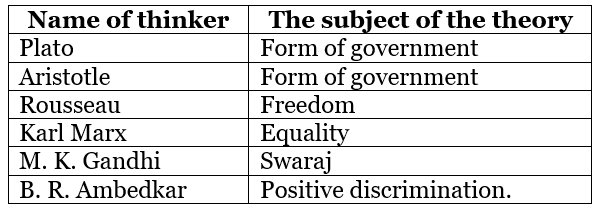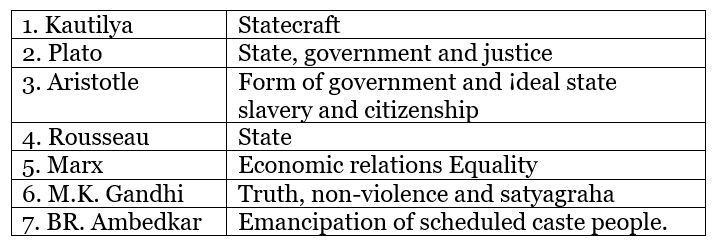Class 11 Political Science Short Questions with Answers- Political Theory
Q1. What is a theory?
Ans: Theory is a judgment that aims to explain a broad concept. It encompasses observation, analysis, and judgment. The term "theory" is derived from the Greek word theoria, which means "to behold" or "to understand." In essence, a theory can be defined as a tested hypothesis.In the context of social sciences, political theory plays a crucial role in both political science and political philosophy. A theory represents a generalised statement based on extensive study, experimentation, and analysis.
Q2. Explain the meaning of Political Theory.
Ans: Political theory is a generalised statement that serves as a generalisation and judgement regarding political leadership, processes, events, and systems. It is based on study, reasoning, and analysis, providing utility for society while receiving support and acceptance from the community. According to David Held, political theories consist of complex networks of concepts and generalisations about political life. These include ideas, assumptions, and statements concerning the nature, purposes, and key features of government, the state, and society, as well as the political capabilities of human beings. Furthermore, political theory is defined as an attempt to explain the attitudes and actions that arise from ordinary political life.
Q3. What is politics?
Ans: Politics is fundamentally rooted in human nature and is often perceived as a natural aspect of society. It is the art of managing and controlling human behaviour. Politics serves as a form of diplomacy and is a method of enforcing one’s authority over others to command their obedience. Additionally, politics functions as a mechanism for gaining and exercising power.
Q4. Mention two important functions of Political Theory.
Ans: Political theory serves as a guiding framework for the direction in which a society or nation ought to progress. It is essential for every subject, evolving through the contributions of students and researchers. This theory plays a pivotal role in the advancement and development of its respective field. Given that every aspect of society intersects with politics, political theory is crucial for both the discipline and society as a whole. Its significance can be understood through the following functions:
- Formulation of concepts and generalisations: Political theory creates foundational ideas that help in understanding political phenomena.
- Providing direction to society: By clarifying existing confusion and uncertainties, political theory inspires and motivates societal progress.
Q5. What are the main stages for building a theory in any subject?
Ans: Building a theory is a comprehensive process. The main stages typically include:
- Observation: Gathering data and information relevant to the subject.
- Explanation: Interpreting the observed data and forming hypotheses.
- Value judgement: Assessing the significance and implications of the theory.
- Acceptance: Gaining recognition of the theory based on its utility and relevance.

Q6. What should be the characteristics of a good theory?
Ans: A good theory should possess the following characteristics:
- It should be free from subjectivity.
- It must be based on discussion, debate, rational thinking, and factual evidence.
- Ideally, it should rely on empiricism.
- Theory must be clear and relevant.
- It should have social, economic, and moral significance.
- Finally, it must be legitimate.
Q7. What is the role of a Political Theorist?
Ans: Political theorists play a crucial role in clarifying the meanings of political concepts, which are created to represent specific situations. They achieve this by examining how these concepts are understood and used in ordinary language.Additionally, they engage in debates and systematically explore the diverse meanings and opinions surrounding these concepts. By studying and analysing the prevailing circumstances of society, a theorist can provide new interpretations of various concepts.In this way, the theorist contributes positively and responsibly to society.
Q8. Discuss Gandhi as a Theorist.
Ans: Gandhi played a decisive role in the liberation movement of India. However, he cannot be categorised as a politician, as he never pursued power or authority through politics. In the liberation movement, he experimented with his concepts of truth, non-violence, and satyagraha.In his analysis of contemporary problems, Gandhi discussed the nature and role of the state. He emphasised the relevance of peace and non-violence in addressing the problems of humanity at large.
Q9. What are the issues and subjects of a political theory?
Ans: Political theory deals with the ideas and principles that shape the constitution government and social life in a systematic manner. It clarifies the meaning of concepts such as equality, liberty, freedom, dignity, justice and secularism. A theorist and his theory are generally related to establishing the truth by a reason-based study.
Q10. What is the importance of politics?
Ans: Politics has gained significant importance in today's life, becoming synonymous with power. It represents the art and capacity to obtain authority and influence others. Politics involves the ability to command obedience by shaping people's behaviours according to one's design. It is an integral part of any society. Mahatma Gandhi once noted that politics envelops us like the coils of a snake, and there is no escape but to engage with it.
Q11. What is the function of Government?
Ans: Political theory is primarily concerned with the study of various political institutions, with the government being the principal institution. Like other social organizations, such as families and tribes, the government plays a vital role in the lives of individuals.The government is responsible for ensuring the security, development, and welfare of its citizens. It formulates and implements policies in key areas, including foreign relations, education, and economics. Over time, the role of the government has expanded significantly in promoting the welfare and development of individuals.
Q12. What is the political role of a political theory?
Ans: Political theory is related to the study of every idea and institution which has political relevance. Politics arises from the fact that we have different visions of what is just and desirable for us and our society. It involves what the government should do or should not do. It conceptualises the political issues and systems of governance which are designed to promote social development.
Q13. Name some thinkers and the issues with which they, had been related.
Ans:

Q14. Why different theories have been given on the same issues at a different point of time?
Ans: Different theories have emerged over time regarding the same issues, as they have been defined, theorised, and understood in various ways. It is important to note that no theory can maintain its relevance indefinitely; as time progresses, its significance may diminish. For instance, the concept of equality has evolved from the views of Plato to those of Marx. Similarly, the notion of justice has been interpreted differently by Plato and Aristotle, despite their roles as teacher and pupil. A theorist is also shaped by the historical context in which they exist. Consequently, they incorporate the essential elements of a concept or institution according to the needs of their society, which may be accepted by the people of that era.
Q15. How a theory is built up?
Ans: Generally, there are three stages in the building of a theory: observation, analysis, and judgement. Political theorists clarify the meanings of political concepts by examining how these concepts are understood and used in ordinary language. They engage in debate and systematically explore the diverse meanings and opinions to reach a value judgement, which is referred to as a theory.
Q16. Define the meaning and need of the theory.
Ans: Theory can be defined as a tested hypothesis. It is a value judgement based on study, reason, facts, observation, and analysis of a particular situation or issue. It serves as a generalisation regarding a specific aspect of social life, economic life, or political life.A theory comprises a body of rules and regulations founded on certain ideologies and methodologies aimed at guiding society in a particular direction. The presence of a theory is crucial for every discipline and area of study, as well as for every society. Without a theory, studies remain directionless and hypothetical. Theories help eliminate the confusion that often prevails in society.Throughout history, numerous theorists have contributed their theories for the benefit of society, each employing different methodologies. For instance, ancient Greek thinkers like Plato and Aristotle formulated theories regarding state society, justice, education, and forms of government. Similarly, figures like Marx and Gandhi proposed their own theories addressing the pressing issues of their time.In conclusion, we can assert that theory is essential for every society at all times.
Q17. Who influenced the values and principles of the Indian Constitution?
Ans: The values and principles of the Indian Constitution were influenced by various political thinkers and activists. Kautilya's ideas, which have been discussed for centuries, laid some foundational concepts. Additionally, key figures like Mahatma Gandhi and Dr. B.R. Ambedkar significantly shaped the Constitution, particularly in areas related to social justice, equality, and the framework of governance
Q18. Explain the area of political theory.
Ans: Every political issue and action falls within the scope of political theory. This field systematically examines questions of political relevance, addressing issues such as freedom, equality, and justice, as well as the institutions like the state, government, and administration. Political theory seeks to explain the meaning and significance of these concepts.Moreover, it clarifies existing definitions by focusing on the major political thinkers of both the past and present. Each political thinker has confronted the problems of their time and provided judgments that society may follow. Political theory also reexamines the meanings and definitions of these concepts, seeking to modify them as needed.The primary objective of political theory is to educate citizens to think rationally about political questions and to assess contemporary political events critically.
Q19. Discuss the subject matter of Political Theory.
Ans: Political theory has a wide scope. In fact, the subject matter of the study of political theory is dependent on the approach which we adopt for the study of political issues.
Followings are the subject matter of political theory:-
- State.
- Government.
- Political concepts like equality, freedom, liberty and justice.
- Political institutions.
- Authority.
- Legitimacy
- Political parties.
- Pressure groups.
- Political process
- Power.
- Policies.
- Contemporary problems.
Q20. Discuss how politics operates.
Ans: Politics lies in the nature of man that is why we regard politics as natural. The interests of the people are different and they are bound to differ. All the people have different visions of what is just or what is unjust. What is desirable for us or what is undesirable for us and our- society. It involves the multiple negotiations that go on in a society through which the collective decisions are made. It is therefore regarded that politics is a mechanism of decision making for society. It is a method of evaluating the relations between the people and the government. It is also a method of influencing the decision-making process at different levels. Through politics, people try to promote social development and help to resolve common problems.
Q21. What is the difference between traditional political theory and modern political theory?
Ans: Political Theory is the outcome of the approach which we adopt for the political issues and political problems. There have been mainly two approaches i.e. Traditional approach and Modem approach. Following are the features of the traditional and modern approach with their difference:-
1. Traditional approach
- It is subjective.
- It is descriptive.
- It is hypothetical.
- It is value-based.
- It is institutional.
- It is philosophical, legal and reformative.
2. Modern approach
- It is objective.
- It is empirical.
- It is scientific.
- It is inter-disciplinary.
- It is based on facts.
- It is analytical.
Q22. Write the names of some prominent theorists with their subject matter.
Ans: Following are names of some prominent theorists with their subject matter:-
Q23. Can you identify the political principle/value which is in the application in each of the following statements/situation?
(a) I should be able to decide which subjects I want to study in. school.
(b) The practice of untouchability has been abolished.
(c) AH Indians are equal before the law.
(d) Minorities can have their own school and colleges.
(e) Foreigners who are visiting India cannot vote in Indian elections.
(f) There should be no censorship in India or films.
(g) Students should be consulted while planning the annual day functions.
(h) Everyone must join the Republic Day celebrations.
Ans:
(a) Right to freedom.
(b) Principle of equality.
(c) Equality before law.
(d) Freedom of religions.
(e) Right to vote(Political right)
(f) Right of expression.
(g) Right of participation.
(h) Principle of nationalism.
Q24. What is the difference between Politicians and Political Thinkers?
Ans: A politician is associated with the power game. He is involved in party-politics. That means a politician is one who practices politics. A politician has a narrow approach. On the other hand, a political theorist offers a solution to the problems of society by studying and analysing them. Political thinkers have a broad view and given direction to the society. There is a clear cut difference between politicians and political theorists. Pt. Jawahar Lai Nehru and Stalin were politicians while Marx and M.K. Gandhi were political thinkers and theorists.
Q25. Discuss the features and characteristics of the Gandhian Theory of politics.
Ans: Gandhi is regarded as a significant thinker and political theorist of his time. His relevance extends beyond India to the entire world and is arguably more pertinent today than ever before. Gandhi illuminated the emptiness of social evils such as casteism, communalism, and untouchability. In his approach, he was closer to Marx in some respects, yet he advocated for the abolition of the state, which he viewed as a mechanical institution. Gandhi’s philosophy is grounded in the principles of:
- Truth
- Non-violence and Satyagraha, which he effectively used to achieve Indian independence.
|
43 videos|268 docs|39 tests
|
FAQs on Class 11 Political Science Short Questions with Answers- Political Theory
| 1. What is the significance of political theory in understanding governance? |  |
| 2. How do major political theories differ from each other? |  |
| 3. What role does political philosophy play in contemporary issues? |  |
| 4. How can one apply political theory to everyday life? |  |
| 5. What are the main criticisms of political theories? |  |

















